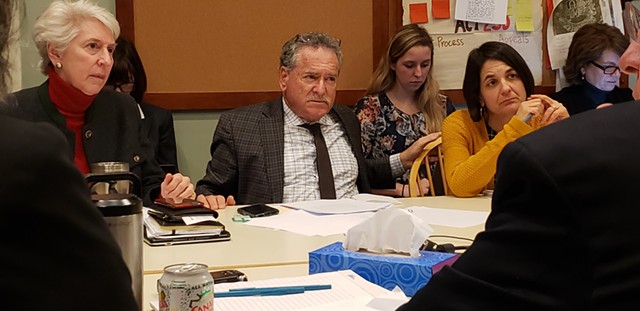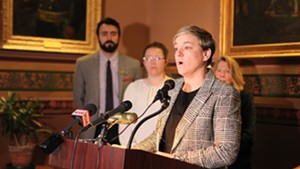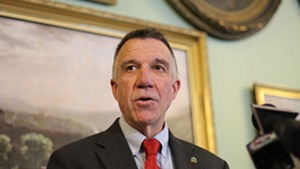
- Kevin McCallum
- Members of the conference committee on a paid family leave bill
Vermont lawmakers struck a tentative deal Wednesday on a compromise bill for a paid family and medical leave program, a goal that eluded them during last session’s impasse.
A negotiating team made up of three senators and three representatives hammered out the deal during two days of what Rep. Tom Stevens (D-Waterbury) called “rough and tumble” negotiations.
While he was disappointed that a key disability insurance provision was not included in the bill, Stevens said he was nevertheless proud of the committee’s accomplishment.
“I think we have to start, and this is a great starting place,” Stevens said.
That theme — that the compromise was the beginning and not the end of the quest for agreement — ran through the remarks of the negotiating team.
Sen. Michael Sirotkin (D-Chittenden) said he wished they could have found ways to make the program stronger.
“We just had to deal with the realities of the building, at this point,” Sirotkin said. “We couldn’t get everything we wanted, but I do think this is a meaningful step.”
Not everyone agreed. One member of the committee, Rep. Diana Gonzalez (P-Winooski), refused to sign the compromise.
She said they had achieved “as strong a bill as we can in the confines of a conference committee,” but she could not support it. A conference committee is what the legislature calls a six-member negotiation team that tries to resolve differences between bills proposed by the Senate and the House.
The committee decided that workers would be allowed to take up to 12 weeks of paid leave to bond with a newborn child. A couple could split up to 24 weeks.
Lower-income workers would receive up to 90 percent of their pay during the leave; higher-paid workers would get a lower percentage. Workers who need to care for a sick family member would get eight weeks of paid leave.
The committee also agreed to require an annual audit to assess the program's effectiveness.
One of the key shortcomings of the compromise, in the eyes of Gonzalez and others, is that temporary disability insurance, or TDI, would not be a required part of the program. The parenting and medical leave benefit programs would be mandatory, meaning all workers in the state would pay for them through a payroll tax. Employers or workers who
want to pay for the disability coverage could opt to do so. But the lack of a mandate left some concerned that few people would enroll, and the costs would be prohibitively high.
“Without universal TDI, it’s not an equitable program. It leaves too many people out,” said Michelle Fay, executive director of Voices for Vermont’s Children.
Fay’s group is part of the Vermont Family and Medical Leave Insurance Coalition, which sought to pressure legislators to require that the benefit be included.
“My organization has been working to establish paid family leave for more than 20 years," she said. "So it’s painful to be in this position where we are saying, ‘This isn’t it.'’’
Both the House and Senate would have to approve the compromise in order to send a bill to Gov. Phil Scott.
The governor has vowed to veto any paid family leave program that increases payroll taxes. Fay said she thinks the shortcomings of the compromise bill will make it impossible for the legislature to win the votes needed to override a veto.
















Comments (3)
Showing 1-3 of 3
Comments are closed.
From 2014-2020, Seven Days allowed readers to comment on all stories posted on our website. While we've appreciated the suggestions and insights, right now Seven Days is prioritizing our core mission — producing high-quality, responsible local journalism — over moderating online debates between readers.
To criticize, correct or praise our reporting, please send us a letter to the editor or send us a tip. We’ll check it out and report the results.
Online comments may return when we have better tech tools for managing them. Thanks for reading.